Saturday, March 14, 2009
Saturday Of the Second Week In Lent
Station Church:
Ss. Marcellino e Pietro al Laterano
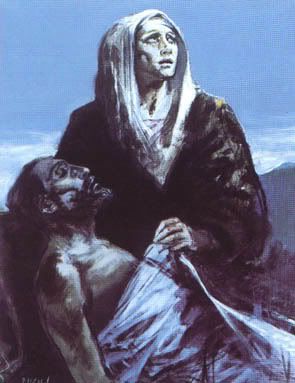
Devotions for a Lenten Saturday holy hour:
Divine Mercy Chaplet
Seven Penitential Psalms
Prayer of St. Thomas More
Threnus Prayer of Saint Augustine
Stabat Mater Dolorosa
Litany of Our Lady of Sorrows
Sorrowful Mysteries
Ss. Marcellino e Pietro al Laterano

Devotions for a Lenten Saturday holy hour:
Divine Mercy Chaplet
Seven Penitential Psalms
Prayer of St. Thomas More
Threnus Prayer of Saint Augustine
Stabat Mater Dolorosa
Litany of Our Lady of Sorrows
Sorrowful Mysteries
Labels: Lent
My Favorite Lenten and Passiontide Hymn
Labels: Lent
Our Blessed Lady's Saturday
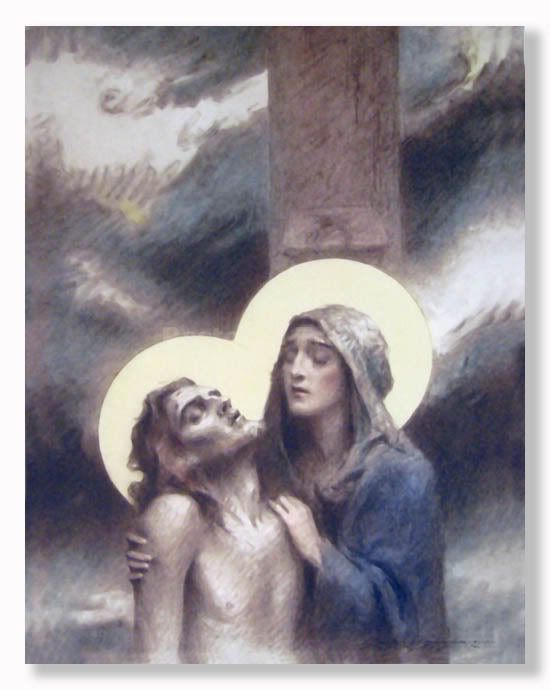
Sea of Sorrow
Oh! on what a sea of sorrow
Was the Virgin-Mother cast,
When her eyes with tears o'erflowing
Gazed upon her Son aghast,
From the bloodstained gibbet taken,
Dying in her arms at last.
In her bitter desolation,
His sweet mouth, His bosom too,
Then His riven side beloved,
Then each hand, both wounded through,
Then His feet, with blood encrimsoned,
Her maternal tears bedew.
She, a hundred times and over,
Strains Him closely to her breast
Heart to Heart, arms arms enfolding,
Are His wounds on her impressed:
Thus, in sorrow's very kisses,
Melts her anguished soul to rest.
Oh, dear Mother! we beseech thee,
By the tears thine eyes have shed,
By the cruel death of Jesus
And His wounds' right royal red,
Make our hearts o'erflow with sorrow
From thy heart's deep fountainhead.
To the Father, Son, and Spirit,
Now we bend on equal knee:
Glory, sempiternal glory,
To the Most High Trinity;
Yea! perpetual praise and honor
Now and through all ages be.
Attributed to Calusto Palumbella, Order of Servites
Labels: Our Blessed Lady
Friday, March 13, 2009
Friday At the Foot Of the Cross
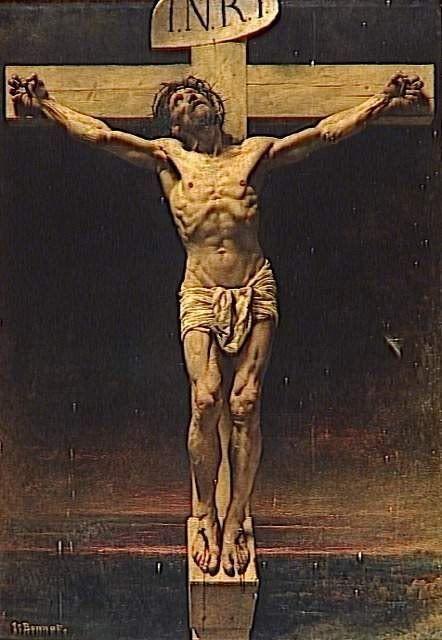
Ant.
Remember not, Lord, our offenses, nor the offenses of our fathers, nor take Thou vengeance upon them.
Psalm 37/38
2 O LORD, rebuke me not in Thy furor; * nor chastise me in Thy wrath.
3 For thy arrows are fastened in me: * and Thy hand hath descended upon me.
4 There is no health in my flesh in the face of Thy wrath: * there is no peace for my bones in the face of my sins.
5 For my iniquities are gone over my head: * and are a heavy burden too heavy to bear.
6 My wounds are putrid and corrupt, * in the face of my foolishness.
7 I am miserable and am bowed down: * all the day long I walked in sadness.
8 For my insides are filled with mocking; * and there is no health in my flesh.
9 Greatly am I afflicted and humbled: * I roared with the groaning of my heart.
10 Lord, before Thee are all my desires, * and my groaning is not hidden from Thee.
11 My heart is troubled, my strength hath left me, * and the light of my eyes themselves is not with me.
12 My friends and my neighbors * have drawn near me and stood against me. And those who were near me stood afar: * They laid snares, those who sought my soul.
13 And they that sought evil for me said wicked things, * all day long they planned deceitful things.
14 But I, as a deaf man, heard not: * and as a dumb man not opening his mouth.
15 And I became like one that heareth not: * and that hath no reproofs in his mouth.
16 For in Thee, O Lord, have I hoped: * Thou wilt hear me, O Lord my God.
17 For I said, "May my enemies never rejoice over me: * when my feet stumble, they speak great things against me."
18 For I am ready for the whip: * and my sorrow is continually before me.
19 For I will declare my inequity: * and I will be sorry for my sin.
20 But my enemies live, and are stronger that I, * and they that hate me wrongfully multiply.
21 They that render evil for good, have humiliated me, * because I followed goodness.
22 Forsake me not, O Lord, * my God, depart not from me.
23 Hasten unto my help, * O Lord, God of my salvation.
GLORY be to the Father, and to the Son, and to the Holy Ghost. As it was in the beginning, is now, and will be forever. Amen.
Prayer Against Anger
Should man reserveth anger for his fellow man and yet seek remedy from God? Should he that hath no mercy on one like himself entreat God for his own sins? Who shall obtain pardon for his sins? (Sir 28:3-5) By these words Thou hast spoken to me though Thy servant Sirach, O Lord God. And after this dare I foster anger and hate against anyone? Spare me, O Lord, spare me of my malice and stubbornness in which I have persevered even unto now. From my soul I now overlook and forgive whatever anyone has done against me. I humbly beg Thee, O Lord, do not rebuke me in Thy anger. O how would that I be like the deaf who does not hear and the mute who does not speak whenever my enemies rise up in force against me, those who seek my soul. Do not forsake me, O lord my God, do not depart from me, for Thou are my patience. (Ps 70:5)
Ant.
Remember not, Lord, our offenses, nor the offenses of our fathers, nor take Thou vengeance upon them.
Labels: Friday At the Foot Of the Cross
My Friends Are Courageous Soldiers, Not "Baby Killers"
Catholic Cavemen, and the source they quote at length, hit the nail on the head and say just what I feel about the treacherous abuse hurled at the 2nd Battalion, Royal Anglian Regiment on its return to the UK from Iraq. The fact that it comes from jihadist sympathizers who should not even be living in the British Isles speaks volumes about the Labour Government and the jihadists themselves.
In 1775, one of the British regiments in Boston was the 10th Regiment of Foot. It became knownfrom 1782 on as the Royal Lincolnshire Regiment. In the 1960s, as the British government economized with the army, the old Royal Lincolnshire Regiment was amalgamated with other regiments to form the 2nd Battalion, Royal Anglian Regiment. Everyone who has donned the redcoat of the 10th Regiment of Foot in refighting the battles of the American War of Independence is a member of the regimental family that is now represented in the British Army as the 2nd Battalion, Royal Anglians. It was our family, our brothers who had tyhose scurrilous accusations hurled at them for thier honorable and courageous service abroad.
That is why I have updated the anti-jihadist photo that I once borrowed from Jovan in my links column. My new knight is wearing the cross of Saint James on his shield and tunic. You know Saint James: Santiago Matamoros, Saint James the Moor-slayer. Not coincidentally, the Spanish troops who fought in Iraq before the Socialists came to power there wore that cross on their sleeves. And so did some troops who fought for the Nationalist side in the Spanish Civil War.
God bless the 2nd Battalion, Royal Anglian Regiment, and welcome home after a job well done!
In 1775, one of the British regiments in Boston was the 10th Regiment of Foot. It became knownfrom 1782 on as the Royal Lincolnshire Regiment. In the 1960s, as the British government economized with the army, the old Royal Lincolnshire Regiment was amalgamated with other regiments to form the 2nd Battalion, Royal Anglian Regiment. Everyone who has donned the redcoat of the 10th Regiment of Foot in refighting the battles of the American War of Independence is a member of the regimental family that is now represented in the British Army as the 2nd Battalion, Royal Anglians. It was our family, our brothers who had tyhose scurrilous accusations hurled at them for thier honorable and courageous service abroad.
That is why I have updated the anti-jihadist photo that I once borrowed from Jovan in my links column. My new knight is wearing the cross of Saint James on his shield and tunic. You know Saint James: Santiago Matamoros, Saint James the Moor-slayer. Not coincidentally, the Spanish troops who fought in Iraq before the Socialists came to power there wore that cross on their sleeves. And so did some troops who fought for the Nationalist side in the Spanish Civil War.
God bless the 2nd Battalion, Royal Anglian Regiment, and welcome home after a job well done!
Friday Of the Second Week In Lent
Station Church:
S. Vitale in Fovea
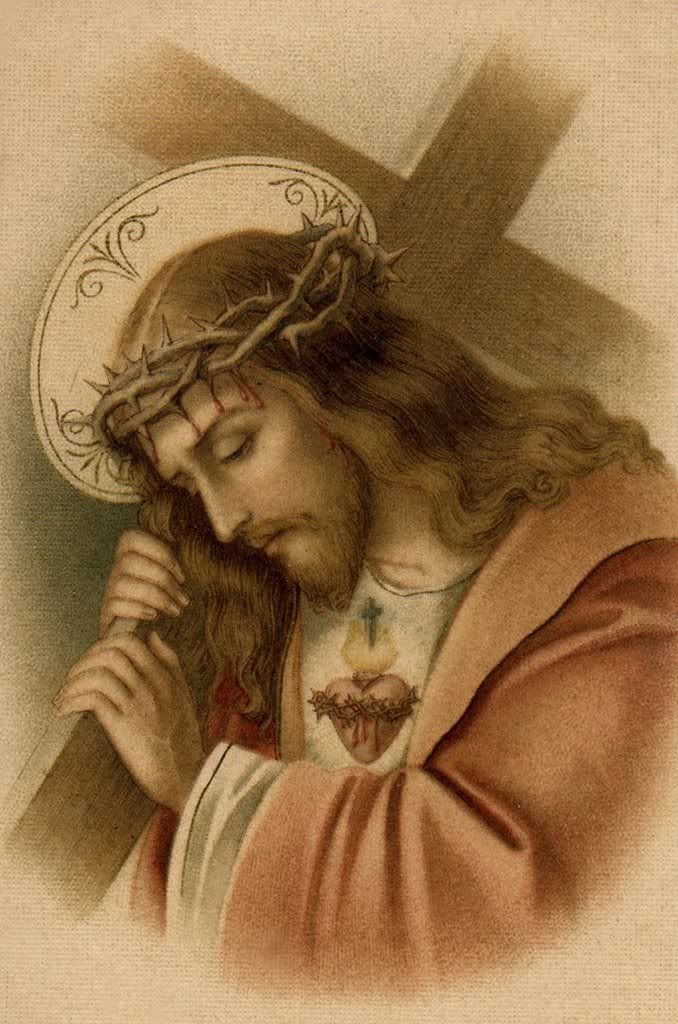
From The Passion And Death Of Jesus Christ, by Saint Alphonsus de Liguori:
O Immaculate Lamb, thus lacerated, covered with blood, disfigured, as I behold Thee on this Cross, how beautiful and how worthy of love dost Thou yet appear to me! Yes, because all of these wounds that I behold on Thee are to me signs and proofs of the great love that Thou bearest to me. O if all men did but contemplate Thee often in that state in which Thou wert one day made a spectacle to all Jerusalem, who could help being seized by Thy love? O my beloved Lord, accept me to love Thee, since I give Thee all my senses and all my will. And how can I refuse Thee anything if Thou hast not refused me Thy Blood, Thy Life, and all Thyself?
Devotions For A Lenten Friday Holy Hour:
Dies Irae
Divine Mercy Chaplet
Seven Penitential Psalms
Prayer of St. Thomas More
Threnus Prayer of Saint Augustine
Devotions To the Holy Cross
Stations of the Cross
S. Vitale in Fovea

From The Passion And Death Of Jesus Christ, by Saint Alphonsus de Liguori:
O Immaculate Lamb, thus lacerated, covered with blood, disfigured, as I behold Thee on this Cross, how beautiful and how worthy of love dost Thou yet appear to me! Yes, because all of these wounds that I behold on Thee are to me signs and proofs of the great love that Thou bearest to me. O if all men did but contemplate Thee often in that state in which Thou wert one day made a spectacle to all Jerusalem, who could help being seized by Thy love? O my beloved Lord, accept me to love Thee, since I give Thee all my senses and all my will. And how can I refuse Thee anything if Thou hast not refused me Thy Blood, Thy Life, and all Thyself?
Devotions For A Lenten Friday Holy Hour:
Dies Irae
Divine Mercy Chaplet
Seven Penitential Psalms
Prayer of St. Thomas More
Threnus Prayer of Saint Augustine
Devotions To the Holy Cross
Stations of the Cross
Labels: Lent
Thursday, March 12, 2009
Thursday Of the Second Week In Lent
Station Church: S. Maria in Trastevere
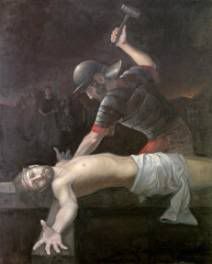
From The Passion And Death Of Jesus Christ, by Saint Alphonsus de Liguori:
O Immaculate Lamb, thus lacerated, covered with blood, disfigured, as I behold Thee on this Cross, how beautiful and how worthy of love dost Thou yet appear to me! Yes, because all of these wounds that I behold on Thee are to me signs and proofs of the great love that Thou bearest to me. O if all men did but contemplate Thee often in that state in which Thou wert one day made a spectacle to all Jerusalem, who could help being seized by Thy love? O my beloved Lord, accept me to love Thee, since I give Thee all my senses and all my will. And how can I refuse Thee anything if Thou hast not refused me Thy Blood, Thy Life, and all Thyself?
Devotions for a Lenten Thursday Holy Hour:
Dies Irae
Divine Mercy Chaplet
Seven Penitential Psalms
Prayer of St. Thomas More
Threnus Prayer of Saint Augustine
Devotion To the Holy Face

From The Passion And Death Of Jesus Christ, by Saint Alphonsus de Liguori:
O Immaculate Lamb, thus lacerated, covered with blood, disfigured, as I behold Thee on this Cross, how beautiful and how worthy of love dost Thou yet appear to me! Yes, because all of these wounds that I behold on Thee are to me signs and proofs of the great love that Thou bearest to me. O if all men did but contemplate Thee often in that state in which Thou wert one day made a spectacle to all Jerusalem, who could help being seized by Thy love? O my beloved Lord, accept me to love Thee, since I give Thee all my senses and all my will. And how can I refuse Thee anything if Thou hast not refused me Thy Blood, Thy Life, and all Thyself?
Devotions for a Lenten Thursday Holy Hour:
Dies Irae
Divine Mercy Chaplet
Seven Penitential Psalms
Prayer of St. Thomas More
Threnus Prayer of Saint Augustine
Devotion To the Holy Face
Labels: Lent
Wednesday, March 11, 2009
Wednesday Of the Second Week In Lent
Station Church: S. Cecilia in Trastevere

From The Passion And Death Of Jesus Christ, by Saint Alphonsus de Liguori:
O sovereign God! Thou hast given Thyself entirely to me; and how than shall I not love Thee with my whole self? I believe, yes, I believe that Thou hast died for me, and how can I then love Thee so little as constantly to forget Thee and all that Thou hast suffered for me? And why Lord, when I think on Thy Passion am I not quite enflamed with Thy love, and I do not entrely become Thine, like so many holy souls who, after meditating on Thy sufferings, have remained the happy prey of Thy love, and have given themselves entirely to Thee?
Devotions for a Lenten Wednesday Holy Hour:
Dies Irae
Divine Mercy Chaplet
Seven Penitential Psalms & the prayers against the Seven Deadly Sins
Prayer of St. Thomas More
Threnus Prayer
Seven Prayers of St. Gregory

From The Passion And Death Of Jesus Christ, by Saint Alphonsus de Liguori:
O sovereign God! Thou hast given Thyself entirely to me; and how than shall I not love Thee with my whole self? I believe, yes, I believe that Thou hast died for me, and how can I then love Thee so little as constantly to forget Thee and all that Thou hast suffered for me? And why Lord, when I think on Thy Passion am I not quite enflamed with Thy love, and I do not entrely become Thine, like so many holy souls who, after meditating on Thy sufferings, have remained the happy prey of Thy love, and have given themselves entirely to Thee?
Devotions for a Lenten Wednesday Holy Hour:
Dies Irae
Divine Mercy Chaplet
Seven Penitential Psalms & the prayers against the Seven Deadly Sins
Prayer of St. Thomas More
Threnus Prayer
Seven Prayers of St. Gregory
Labels: Lent
Tuesday, March 10, 2009
Tuesday Of the Second Week In Lent
Station Church: S. Balbina all'Aventino
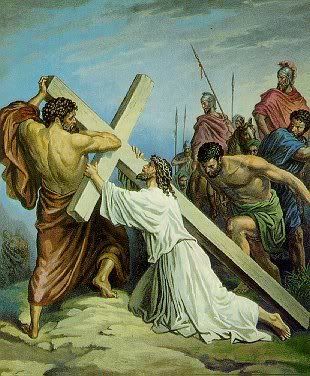
From The Passion And Death Of Jesus Christ, by Saint Alphonsus de Liguori:
O my dearest Jesus, in order to show me the great love Thou bearest me, Thou wouldst not commit the work of my redemption to any other than Thyself. Was my love, then, of such consequence to Thee that Thou wouldst suffer so much in order to gain it? O what more couldst Thou have done if Thou hadst to gain to Thyself the love of Thy Divine Father? What more could a servant ensure to acquire to himself the affections of his master than what Thou hast suffered in order that Thou mayest be loved by me, a vile, ungrateful slave?
Devotions for a Lenten Tuesday Holy Hour:
Dies Irae
Divine Mercy Chaplet
Seven Penitential Psalms
Prayer of St. Thomas More
Threnus Prayer of Saint Augustine
Devotion of the Seven Last Words

From The Passion And Death Of Jesus Christ, by Saint Alphonsus de Liguori:
O my dearest Jesus, in order to show me the great love Thou bearest me, Thou wouldst not commit the work of my redemption to any other than Thyself. Was my love, then, of such consequence to Thee that Thou wouldst suffer so much in order to gain it? O what more couldst Thou have done if Thou hadst to gain to Thyself the love of Thy Divine Father? What more could a servant ensure to acquire to himself the affections of his master than what Thou hast suffered in order that Thou mayest be loved by me, a vile, ungrateful slave?
Devotions for a Lenten Tuesday Holy Hour:
Dies Irae
Divine Mercy Chaplet
Seven Penitential Psalms
Prayer of St. Thomas More
Threnus Prayer of Saint Augustine
Devotion of the Seven Last Words
Labels: Lent
Monday, March 09, 2009
Monday Of the Second Week In Lent
Station Church: S. Clemente presso il Colosseo
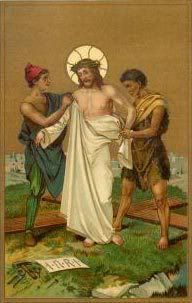
From The Passion And Death Of Jesus Christ, by Saint Alphonsus de Liguori:
O God, the lover of men, what more couldst Thou have said or have done in order to put me under the necessity of loving Thee? And what good could my love ever do Thee that Thou didst choose to die, and did so much desire death in order to obtain it? If a servant of mine had only desired to die for me, he would have attracted my love; and can I then live without loving Thee with all my heart, my King and my God, who didst die for me, and who had such a longing for death in order to acquire to Thyself my love?
Devotions For A Lenten Monday Holy Hour:
Dies Irae
Divine Mercy Chaplet
Seven Penitential Psalms
Prayer of St. Thomas More
Threnus Prayer of Saint Augustine
Devotion of the Five Sacred Wounds

From The Passion And Death Of Jesus Christ, by Saint Alphonsus de Liguori:
O God, the lover of men, what more couldst Thou have said or have done in order to put me under the necessity of loving Thee? And what good could my love ever do Thee that Thou didst choose to die, and did so much desire death in order to obtain it? If a servant of mine had only desired to die for me, he would have attracted my love; and can I then live without loving Thee with all my heart, my King and my God, who didst die for me, and who had such a longing for death in order to acquire to Thyself my love?
Devotions For A Lenten Monday Holy Hour:
Dies Irae
Divine Mercy Chaplet
Seven Penitential Psalms
Prayer of St. Thomas More
Threnus Prayer of Saint Augustine
Devotion of the Five Sacred Wounds
Labels: Lent
Sunday, March 08, 2009
Second Sunday Of Lent
Station Church: S. Maria in Domenica alla Navicella
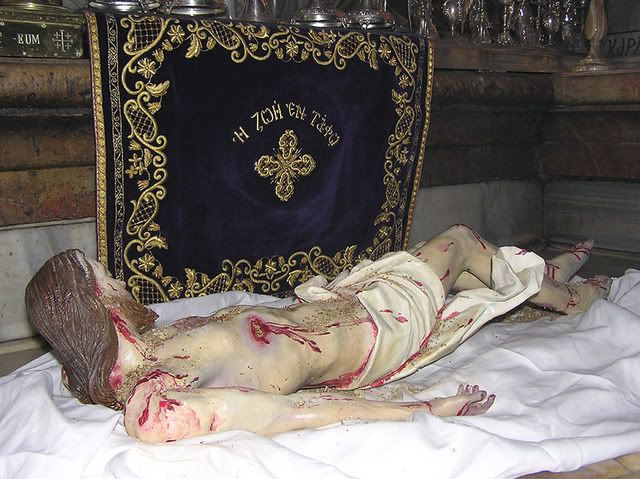
From The Passion And Death of Jesus Christ, by Saint Alphonsus de Liguori:
O my Lord, I do indeed know how much Thou hast done and suffered for my sake. But Thou knowest, alas, that I have hitherto done nothing for Thee. My Jesus, help me to suffer something for Thy love before death overtakes me! I am ashamed of appearing before Thee, but I will no longer be ungrateful, as I have been so many years towards Thee. Thou hast deprived Thyself of every pleasure for me. I will for Thee renounce all the pleasures of the senses. Thou hast suffered so many pains for me, I will, for Thy sake, suffer all of the pains of my life and my death, as it shall best please Thee. Thou hast been forsaken: I will be content that all should forsake me, provided Thou dost not forsake me, O my only and sovereign good. Thou hast been persecuted. I accept whatever persecution may befall me. Finally, Thou hast died for me. I will die for Thee. O my Jesus, my Treasure, my Love, my All, I love Thee. O give me more love.
Amen.
Devotions for a Lenten Sunday Holy Hour:
Divine Mercy Chaplet
Seven Penitential Psalms
Prayer of St. Thomas More
Psalter of St. Jerome
Threnus Prayer of St. Augustine
From The Liturgical Year, by Abbot Prosper Gueranger, OSB:
THE subject offered to our consideration, on this second Sunday, is one of the utmost importance for the holy season. The Church applies to us the lesson which our Saviour gave to three of His apostles. Let us endeavour to be more attentive to it than they were.
Jesus was about to pass from Galilee into Judea, that He might go up to Jerusalem and be present at the feast of the Pasch. It was that last Pasch, which was to begin with the immolation of the figurative lamb, and end with the sacrifice of the Lamb of God, who taketh away the sins of the world. Jesus would have His disciples know Him. His works had borne testimony to Him, even before those who were, in a manner, strangers to Him; but as for His disciples, had they not every reason to be faithful to Him, even to death? Had they not listened to His words, which had such power with them that they forced conviction? Had they not experienced His love, which it was impossible to resist? And had they not seen how patiently He had borne with their strange and untoward ways? Yes, they must have known Him. They had heard one of their company, Peter, declare that He was the Christ, the Son of the living God. [St. Matt. xvi. 16.] Notwithstanding this, the trial to which their faith was soon to be put was of such a terrible kind, that Jesus would mercifully arm them against temptation by an extraordinary grace.
The cross was to be a scandal and a stumbling-block [1 Cor. i. 23.] to the Synagogue, and alas! to more than it. Jesus said to His apostles at the last Supper: 'All of you shall be scandalized in Me this night.' [St. Matt. xxvi. 31.] Carnal-minded as they then were, what would they think when they should see Him seized by armed men, handcuffed, hurried from one tribunal to another, and doing nothing to defend Himself! And when they found that the high priests and pharisees, who had hitherto been so often foiled by the wisdom and miracles of Jesus, had now succeeded in their conspiracy against Him, what a shock to their confidence! But there was to be something more trying still: the people, who, but a few days before, greeted Him so enthusiastically with their Hosannas, would demand His execution; and He would have to die, between two thieves, on the cross, amidst the insults of His triumphant enemies.
Is it not to be feared that these disciples, when they witness His humiliations and sufferings, will lose their courage? They have lived in His company for three years; but when they see that the things He foretold would happen to Him are really fulfilled, will the remembrance of all they have seen and heard keep them loyal to Him? Or will they turn cowards and flee from Him? Jesus selects three out of the number, who are especially dear to Him: Peter, whom He has made the rock, on which His Church is to be built, and to whom He has promised the keys of the kingdom of heaven; James, the son of thunder, who is to be the first martyr of the apostolic college; and John, James's brother, and His own beloved disciple. Jesus has resolved to take them aside, and show them a glimpse of that glory, which, until the day fixed for its manifestation, He conceals from the eyes of mortals.
He therefore leaves the rest of His disciples in the plain near Nazareth, and goes in company with the three privileged ones towards a high hill called Thabor, which is a continuation of Libanus, and which the psalmist tells us was to rejoice in the name of the Lord. [Ps. lxxxviii. 13.] No sooner has He reached the summit of the mountain, than the three apostles observe a sudden change come over Him; His Face shines as the sun, and His humble garments become white as snow. They observe two venerable men approach and speak with Him upon what He is about to suffer in Jerusalem. One is Moses, the lawgiver; the other is Elias, the prophet, who was taken up from earth on a fiery chariot without having passed through the gates of death. These two great representatives of the Jewish religion, the Law and the Prophets, humbly adore Jesus of Nazareth. The three apostles are not only dazzled by the brightness which comes from their divine Master; but they are filled with such a rapture of delight, that they cannot bear the thought of leaving the place. Peter proposes to remain there for ever and build three tabernacles, for Jesus, Moses, and Elias. And while they are admiring the glorious sight, and gazing on the beauty of their Jesus' human Nature, a bright cloud overshadows them, and a voice is heard speaking to them: it is the voice of the eternal Father, proclaiming the Divinity of Jesus, and saying: 'This is My beloved Son!'
This transfiguration of the Son of Man, this manifestation of His glory, lasted but a few moments: His mission was not on Thabor; it was humiliation and suffering in Jerusalem. He therefore withdrew into Himself the brightness He had allowed to transpire; and when He came to the three apostles, who, on hearing the voice from the cloud, had fallen on their faces with fear, they could see no one save only Jesus. The bright cloud was gone; Moses and Elias had disappeared. What a favour they have had bestowed upon them! Will they remember what they have seen and heard? They have had such a revelation of the Divinity of their dear Master! Is it possible that, when the hour of trial comes, they will forget it, and doubt His being God? And when they see Him suffer and die, will they be ashamed of Him and deny Him? Alas! the Gospel has told us what happened to them.
A short time after this, our Lord celebrated His last Supper with His disciples. When the supper was over, He took them to another mount, Mount Olivet, which lies to the east of Jerusalem. Leaving the rest at the entrance of the garden, He advances with Peter, James, and John, and then says to them: 'My soul is sorrowful even unto death: stay you here and watch with Me.' [St. Matt. xxvi. 38.] He then retires some little distance from them, and prays to His eternal Father. The Heart of our Redeemer is weighed down with anguish. When He returns to His three disciples, He is enfeebled by the agony He has suffered, and His garments are saturated with Blood. The apostles are aware that He is sad even unto death, and that the hour is close at hand when He is to be attacked: are they keeping watch? are they ready to defend Him? No: they seem to have forgotten Him; they are fast asleep, for their eyes are heavy. [Ibid. 43.] Yet a few moments, and all will have fled from Him; and Peter, the bravest of them all, will be taking his oath that he never knew the Man.
After the Resurrection our three apostles made ample atonement for this cowardly and sinful conduct, and acknowledged the mercy wherewith Jesus had sought to fortify them against temptation, by showing them His glory on Thabor a few days before His Passion. Let us not wait till we have betrayed Him: let us at once acknowledge that He is our Lord and our God. We are soon to be keeping the anniversary of His Sacrifice; like the apostles, we are to see Him humbled by His enemies and bearing, in our stead, the chastisements of divine justice. We must not allow our faith to be weakened, when we behold the fulfilment of those prophecies of David and Isaias, that the Messias is to be treated as a worm of the earth, [Ps. xxi. 7.] and be covered with wounds, so as to become like a leper, the most abject of men, and the Man of sorrows. [Is. liii. 3. 4.] We must remember the grand things of Thabor, and the adorations paid Him by Moses and Elias, and the bright cloud, and the voice of the eternal Father. The more we see Him humbled, the more must we proclaim His glory and divinity; we, must join our acclamations with those of the angels and the four-and-twenty elders, whom St. John, one of the witnesses of the Transfiguration, heard crying out with a loud voice: 'The Lamb that was slain, is worthy to receive power and divinity, and wisdom, and strength, and honour, and glory, and benediction!' [Apoc. v. 12.]
The second Sunday of Lent is called, from the first word of the Introit, Reminiscere; and also Transfiguration-Sunday, on account of the Gospel which is read in the Mass.
The Station at Rome is in the church of St. Mary in Dominica, on Monte Celio. Tradition tells us that in this basilica was the diaconicum of which St. Laurence had charge, and from which he distributed to the poor the alms of the Church

From The Passion And Death of Jesus Christ, by Saint Alphonsus de Liguori:
O my Lord, I do indeed know how much Thou hast done and suffered for my sake. But Thou knowest, alas, that I have hitherto done nothing for Thee. My Jesus, help me to suffer something for Thy love before death overtakes me! I am ashamed of appearing before Thee, but I will no longer be ungrateful, as I have been so many years towards Thee. Thou hast deprived Thyself of every pleasure for me. I will for Thee renounce all the pleasures of the senses. Thou hast suffered so many pains for me, I will, for Thy sake, suffer all of the pains of my life and my death, as it shall best please Thee. Thou hast been forsaken: I will be content that all should forsake me, provided Thou dost not forsake me, O my only and sovereign good. Thou hast been persecuted. I accept whatever persecution may befall me. Finally, Thou hast died for me. I will die for Thee. O my Jesus, my Treasure, my Love, my All, I love Thee. O give me more love.
Amen.
Devotions for a Lenten Sunday Holy Hour:
Divine Mercy Chaplet
Seven Penitential Psalms
Prayer of St. Thomas More
Psalter of St. Jerome
Threnus Prayer of St. Augustine
From The Liturgical Year, by Abbot Prosper Gueranger, OSB:
THE subject offered to our consideration, on this second Sunday, is one of the utmost importance for the holy season. The Church applies to us the lesson which our Saviour gave to three of His apostles. Let us endeavour to be more attentive to it than they were.
Jesus was about to pass from Galilee into Judea, that He might go up to Jerusalem and be present at the feast of the Pasch. It was that last Pasch, which was to begin with the immolation of the figurative lamb, and end with the sacrifice of the Lamb of God, who taketh away the sins of the world. Jesus would have His disciples know Him. His works had borne testimony to Him, even before those who were, in a manner, strangers to Him; but as for His disciples, had they not every reason to be faithful to Him, even to death? Had they not listened to His words, which had such power with them that they forced conviction? Had they not experienced His love, which it was impossible to resist? And had they not seen how patiently He had borne with their strange and untoward ways? Yes, they must have known Him. They had heard one of their company, Peter, declare that He was the Christ, the Son of the living God. [St. Matt. xvi. 16.] Notwithstanding this, the trial to which their faith was soon to be put was of such a terrible kind, that Jesus would mercifully arm them against temptation by an extraordinary grace.
The cross was to be a scandal and a stumbling-block [1 Cor. i. 23.] to the Synagogue, and alas! to more than it. Jesus said to His apostles at the last Supper: 'All of you shall be scandalized in Me this night.' [St. Matt. xxvi. 31.] Carnal-minded as they then were, what would they think when they should see Him seized by armed men, handcuffed, hurried from one tribunal to another, and doing nothing to defend Himself! And when they found that the high priests and pharisees, who had hitherto been so often foiled by the wisdom and miracles of Jesus, had now succeeded in their conspiracy against Him, what a shock to their confidence! But there was to be something more trying still: the people, who, but a few days before, greeted Him so enthusiastically with their Hosannas, would demand His execution; and He would have to die, between two thieves, on the cross, amidst the insults of His triumphant enemies.
Is it not to be feared that these disciples, when they witness His humiliations and sufferings, will lose their courage? They have lived in His company for three years; but when they see that the things He foretold would happen to Him are really fulfilled, will the remembrance of all they have seen and heard keep them loyal to Him? Or will they turn cowards and flee from Him? Jesus selects three out of the number, who are especially dear to Him: Peter, whom He has made the rock, on which His Church is to be built, and to whom He has promised the keys of the kingdom of heaven; James, the son of thunder, who is to be the first martyr of the apostolic college; and John, James's brother, and His own beloved disciple. Jesus has resolved to take them aside, and show them a glimpse of that glory, which, until the day fixed for its manifestation, He conceals from the eyes of mortals.
He therefore leaves the rest of His disciples in the plain near Nazareth, and goes in company with the three privileged ones towards a high hill called Thabor, which is a continuation of Libanus, and which the psalmist tells us was to rejoice in the name of the Lord. [Ps. lxxxviii. 13.] No sooner has He reached the summit of the mountain, than the three apostles observe a sudden change come over Him; His Face shines as the sun, and His humble garments become white as snow. They observe two venerable men approach and speak with Him upon what He is about to suffer in Jerusalem. One is Moses, the lawgiver; the other is Elias, the prophet, who was taken up from earth on a fiery chariot without having passed through the gates of death. These two great representatives of the Jewish religion, the Law and the Prophets, humbly adore Jesus of Nazareth. The three apostles are not only dazzled by the brightness which comes from their divine Master; but they are filled with such a rapture of delight, that they cannot bear the thought of leaving the place. Peter proposes to remain there for ever and build three tabernacles, for Jesus, Moses, and Elias. And while they are admiring the glorious sight, and gazing on the beauty of their Jesus' human Nature, a bright cloud overshadows them, and a voice is heard speaking to them: it is the voice of the eternal Father, proclaiming the Divinity of Jesus, and saying: 'This is My beloved Son!'
This transfiguration of the Son of Man, this manifestation of His glory, lasted but a few moments: His mission was not on Thabor; it was humiliation and suffering in Jerusalem. He therefore withdrew into Himself the brightness He had allowed to transpire; and when He came to the three apostles, who, on hearing the voice from the cloud, had fallen on their faces with fear, they could see no one save only Jesus. The bright cloud was gone; Moses and Elias had disappeared. What a favour they have had bestowed upon them! Will they remember what they have seen and heard? They have had such a revelation of the Divinity of their dear Master! Is it possible that, when the hour of trial comes, they will forget it, and doubt His being God? And when they see Him suffer and die, will they be ashamed of Him and deny Him? Alas! the Gospel has told us what happened to them.
A short time after this, our Lord celebrated His last Supper with His disciples. When the supper was over, He took them to another mount, Mount Olivet, which lies to the east of Jerusalem. Leaving the rest at the entrance of the garden, He advances with Peter, James, and John, and then says to them: 'My soul is sorrowful even unto death: stay you here and watch with Me.' [St. Matt. xxvi. 38.] He then retires some little distance from them, and prays to His eternal Father. The Heart of our Redeemer is weighed down with anguish. When He returns to His three disciples, He is enfeebled by the agony He has suffered, and His garments are saturated with Blood. The apostles are aware that He is sad even unto death, and that the hour is close at hand when He is to be attacked: are they keeping watch? are they ready to defend Him? No: they seem to have forgotten Him; they are fast asleep, for their eyes are heavy. [Ibid. 43.] Yet a few moments, and all will have fled from Him; and Peter, the bravest of them all, will be taking his oath that he never knew the Man.
After the Resurrection our three apostles made ample atonement for this cowardly and sinful conduct, and acknowledged the mercy wherewith Jesus had sought to fortify them against temptation, by showing them His glory on Thabor a few days before His Passion. Let us not wait till we have betrayed Him: let us at once acknowledge that He is our Lord and our God. We are soon to be keeping the anniversary of His Sacrifice; like the apostles, we are to see Him humbled by His enemies and bearing, in our stead, the chastisements of divine justice. We must not allow our faith to be weakened, when we behold the fulfilment of those prophecies of David and Isaias, that the Messias is to be treated as a worm of the earth, [Ps. xxi. 7.] and be covered with wounds, so as to become like a leper, the most abject of men, and the Man of sorrows. [Is. liii. 3. 4.] We must remember the grand things of Thabor, and the adorations paid Him by Moses and Elias, and the bright cloud, and the voice of the eternal Father. The more we see Him humbled, the more must we proclaim His glory and divinity; we, must join our acclamations with those of the angels and the four-and-twenty elders, whom St. John, one of the witnesses of the Transfiguration, heard crying out with a loud voice: 'The Lamb that was slain, is worthy to receive power and divinity, and wisdom, and strength, and honour, and glory, and benediction!' [Apoc. v. 12.]
The second Sunday of Lent is called, from the first word of the Introit, Reminiscere; and also Transfiguration-Sunday, on account of the Gospel which is read in the Mass.
The Station at Rome is in the church of St. Mary in Dominica, on Monte Celio. Tradition tells us that in this basilica was the diaconicum of which St. Laurence had charge, and from which he distributed to the poor the alms of the Church
Labels: Lent






































































































